There are plenty of people who have become very successful as painters, writers, and chefs without a formal education. For this reason, education in creative pursuits might sometimes seem like a “waste of money.” So is it worth the cost?
Well, let’s remember that for every successful creative who didn’t attend school, you can find one who did.
Artist Frida Kahlo had no formal artistic training. But Pablo Picasso did, starting his art education at age 13.
Novelist Ernest Hemingway didn’t get a college education. But Toni Morrison did, studying English at Howard University.
And Chef Thomas Keller didn’t go to culinary school. But chefs James Beard, Julia Child, Christina Tosi, and David Chang all did.
Culinary school, like any postsecondary education, requires a financial investment. So if you can get a job as a cook without it, is culinary school a waste of money?
No! And here’s why.
Who Should Go to Culinary School?
While culinary school is not a waste of money, it’s not necessarily the right choice for everyone. If you’re passionate about cooking and excited about working in a high-energy kitchen environment, then culinary school may help prepare you for a thrilling career. If the idea of sitting in a cubicle all day and working at a computer bores you to tears, then hands-on work may be right for you. And if you want to help people connect over shared dining experiences, then you may have the makings of a professional cook.
“Escoffier has helped me to achieve my goals. By the time I graduated, I was confident [enough] to start my own restaurant during COVID.”*
Chef Arnold Safari, Escoffier Online Culinary Arts Graduate
On the other hand, if you’re looking for a way to make money for a couple of years before you pursue a degree or a career choice in another industry, then investing in culinary school may not be a wise choice. Likewise, those who don’t put in the work required during their culinary school experience may struggle to get all the value out of their programs.
So do a little soul searching before you decide to attend culinary school. It’s worth it—if you put in the work!
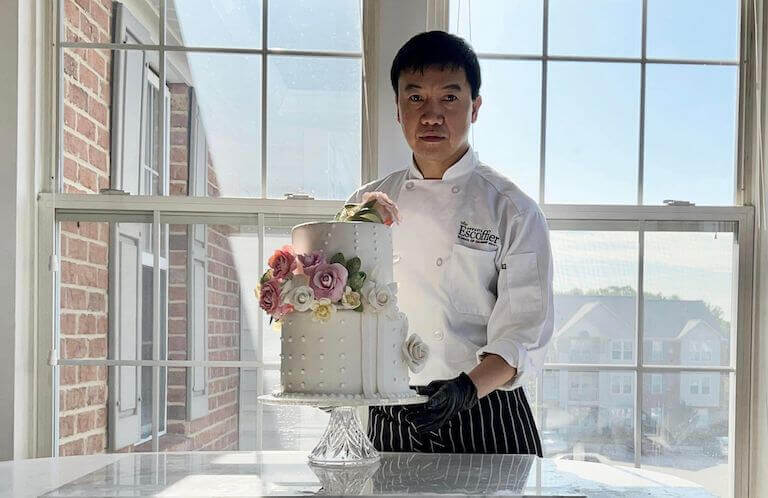
Baking & Pastry Arts student Danny N. with his final cake.
Why Culinary School Is Not a Waste of Money
The benefits of culinary school start the day you enter the classroom. But they continue long past the day you graduate. Here’s why culinary school is a worthwhile investment.
1. Culinary School May Open Doors to More Job Opportunities
Not all employers require a culinary degree or diploma from their cooks and chefs. But some do. Do you want to limit your potential employment options–or opportunities for promotion–by skipping an education?
Starting your career as a professional cook with a degree or diploma could help give you a leg up over other candidates with less education. And even later in your career, employers often like to see a degree or diploma on a cook’s resume, as it can help demonstrate their commitment to the culinary industry.
The best resumes usually include both a culinary school education and some experience in the industry. This is why online culinary education can be so valuable, as it allows students the flexibility to work and study at the same time. By graduation day, even beginners could have an associate degree PLUS over a year of work experience on their resumes.
“Off the start I got a raise [after culinary school]. It also showed higher ups that I had determination, commitment, and knowledge.”*
Christine Miller, Escoffier Online Culinary Arts Graduate
2. Culinary School Could Expose Students to More Skills and Techniques than On-The-Job Training
There is plenty to learn in a professional kitchen. But when you learn your trade on the job, you only learn what is necessary to execute that kitchen’s menu. For example, why would the sous chef take the time to teach you about a technique that isn’t necessary to do your job?
For this reason, on-the-job training, while valuable to your specific role, can possibly be limited if you’re interested in becoming a well-rounded cook or chef.
In culinary school, on the other hand, students may explore a wider variety of skills, including world cuisines, advanced cooking techniques, and strategies for sustainability.
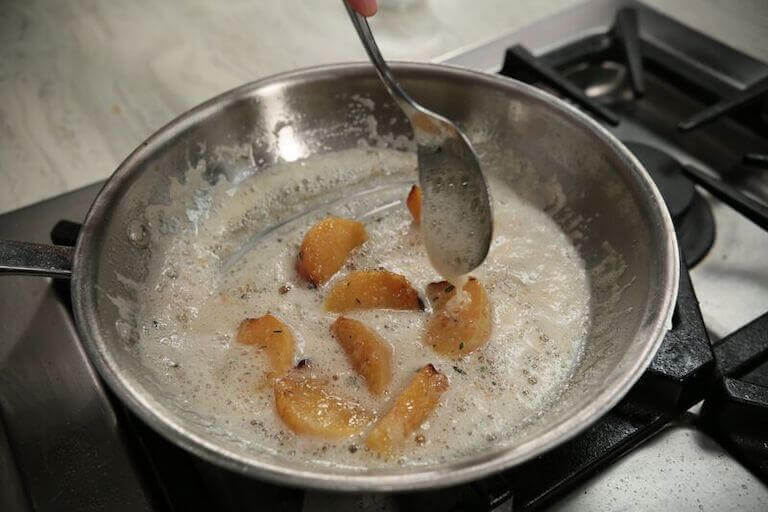
3. Formal Education May Help Grads Start Their Careers with Good Habits
The cooks in a professional kitchen weren’t hired because they’re good educators. They were hired because they’re good cooks. This means they may not be the best people to teach you the fundamentals of cooking professionally.
When you enter a restaurant kitchen without a base of culinary knowledge, you risk picking up bad habits that can hinder your future growth. If a more experienced cook tells you something is “good enough,” you’re likely to believe them! But if you know that their cleaning method isn’t actually sanitizing that surface, you can avoid making a costly—and potentially dangerous—mistake.
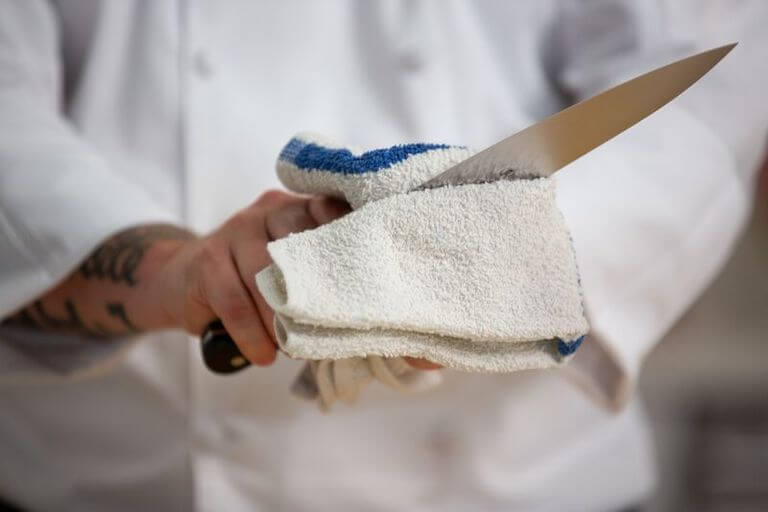
4. Students Can Get Their Foot in the Door with a Culinary Externship
A culinary externship could be the way into your dream job. Restaurants, bakeries, and food establishments of all types take on externs from culinary schools, exposing students to a work environment that they may not have experienced otherwise.
Escoffier graduate Parker Wilks-Bryant was an extern at Pujol in Mexico City, one of the best restaurants in the world. Without culinary school, Parker may not have been able to secure a hands-on industry externship in this highly competitive kitchen!*
Some externships even lead to offers of full-time employment. While this is never a guarantee, it is one avenue that students can pursue to get in the door of their dream restaurant. Even if that job offer doesn’t pan out right away, students can always apply again when they have a few years of experience under their belts, and point to that previous externship on their resumes.
Making the Most of Your Investment in Culinary School
There are many benefits to attending culinary school beyond what you learn in the classroom (although that’s clearly a major part of it!) By taking advantage of everything culinary school has to offer, you may increase the value of your investment and could find that you’ve better positioned yourself for your future career.
What does this look like?
Get To Know Your Chef Instructors
Escoffier has over 150 professional Chef Instructors on the faculty. They include Certified Executive Chefs®, entrepreneurs, cookbook authors, industry leaders, and award-winners. Outside of culinary school, you’re unlikely to ever encounter such a skilled group of experts in one place! Chef Instructors share their cooking knowledge, but they may also be invaluable resources for career advice, mentorship, and even industry introductions.
“You have mentors in a restaurant setting, but you won’t get the variety. At Escoffier, you’re exposed to 10+ executive chefs, and you’re surrounded by them every day. There’s a wealth of mentorship at your fingertips.”*
Shane Witters-Hicks, Escoffier Boulder Graduate & Private Chef/Educator, The Soulful Spread
Connect with Your Fellow Students
The chefs and industry leaders of tomorrow are the culinary students of today. That means the person cutting carrots next to you could be the next David Chang. The person kneading dough across the room could be the next Christina Tosi.*
These people can become a foundational part of your professional network. The connections you make in culinary school may be the sources of future job opportunities, advice, or collaborations. If your dream job came to you through a culinary school friend, would you call that school investment a waste of money?
Take Advantage of Extracurricular Opportunities
Escoffier’s campuses may offer opportunities for learning and networking outside of the classroom. For example, food festivals in Boulder and Austin have asked for student volunteers to help chefs in their booths in the past. This is a wonderful chance to get some fast-paced practice, and to meet some of the city’s best chefs.
There may also be optional online webinars, where a Chef Instructor or a visiting chef will share what they know with students. And online students may also get the chance to attend optional in-person Farm to Table® events near where they live.
“There are a lot of culinary schools that don’t even mention farm-to-table or sustainability practices. They don’t get into the farming. And so I think the fact that we have [the Farm to Table® Experience], and we have so many instructors who actually care about it is really important to the students.”*
Jon Todd, Escoffier Chef Instructor and Chef/Owner, Deadfox
How to Pay for Culinary School
The cost of culinary education can range widely. From pricey four-year schools that can cost as much as $100,000 to community college programs that are much less expensive, you can’t paint all culinary schools with the same broad financial brush.
Students are smart to consider the financial investment necessary to pay for their education, and consider how long it will take to repay any student loans they may need to take out.
At Escoffier, programs range from under $20,000 to just over $30,000 per program. This investment is much more feasible for many students than a four-year college. Here’s how students can bring this education within financial reach.

Student Loans
If you attend an accredited culinary school like Escoffier, you may be eligible for federal student loans if you apply and qualify. These loans may have lower interest rates and more favorable repayment terms than private loans, which is why they are often the first source students seek to fund their education.
The majority of Escoffier students use some form of financial aid to help pay for their education! That’s why we have a dedicated financial aid team that helps students to complete their paperwork and secure their funding.
“Just filling out the application and the FAFSA were the most difficult things I had to do to get the process rolling. The Financial Aid Department was great at communicating with me. Jordan and the team at Escoffier were always emailing me back and letting me know where I was and how things were going.”*
Brent Unruh, Escoffier Culinary Arts Graduate
Scholarships and Grants
Culinary scholarships and grants are financial awards that students don’t have to repay. They can come from private companies, nonprofit organizations, and even the schools themselves.
Escoffier offers need-based scholarships to help qualifying students pay for their education. Other awards are merit-based, like the James Beard Foundation scholarships. And there are competition-based scholarships, providing financing to students who participate in culinary events.
An introduction to the annual Young Escoffier High School Competition in Austin, Texas
Military and Veterans Benefits
Active military and veterans have additional resources they may be able to use to fund their education. Government funding can come through the Veterans Administration or theDepartment of Defense.
As a 2021-2022 Military Friendly® School (designated on our Boulder campus and includes our online programs), Escoffier is committed to providing support and education to military members and veterans, helping them to skill up and work towards a new career.
A Worthwhile Investment in Your Future
If you’re on the fence about attending culinary school, you have a lot to consider. But for those who are passionate about cooking and see themselves thriving in the high-energy environment of a kitchen, getting that education is a smart step toward a fulfilling career in food.
Culinary school is certainly an investment of time and money. But it’s one that could pay off in the form of more job opportunities, professional skills, and industry connections. Even if you’re already years into cooking professionally, attending culinary school could help propel you to that next level.
To learn more about the financial side of culinary school, talk to a financial advisor today.
Read these articles to explore the value of culinary education:
- How Much Education Do You Need to Become a Chef?
- Is a Culinary Diploma or Degree Worth It?
- What Every High School Student Should Know About Culinary School
*Information may not reflect every student’s experience. Results and outcomes may be based on several factors, such as geographical region or previous experience.

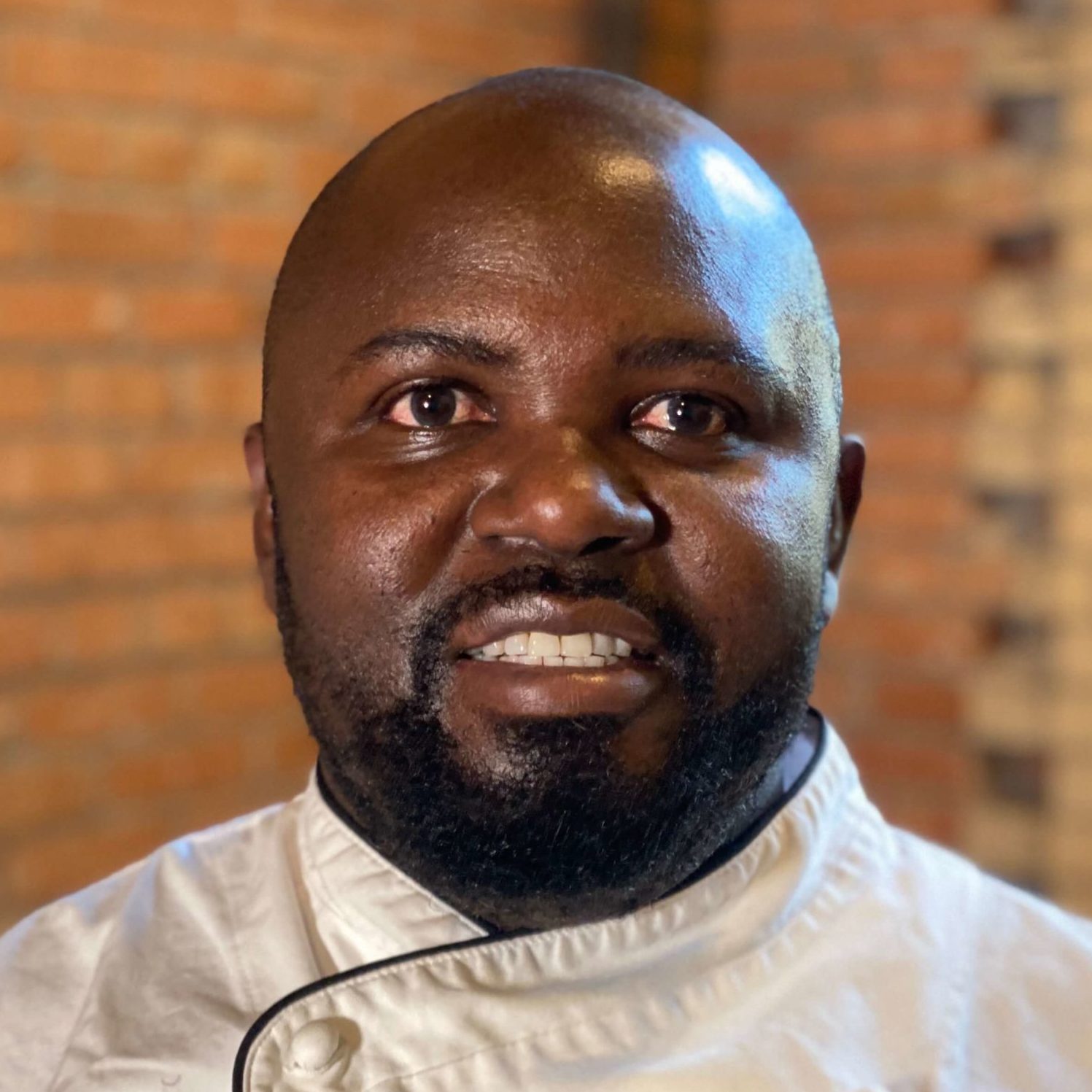 “Escoffier has helped me to achieve my goals. By the time I graduated, I was confident [enough] to start my own restaurant during COVID.”*
“Escoffier has helped me to achieve my goals. By the time I graduated, I was confident [enough] to start my own restaurant during COVID.”* “You have mentors in a restaurant setting, but you won’t get the variety. At Escoffier, you’re exposed to 10+ executive chefs, and you’re surrounded by them every day. There’s a wealth of mentorship at your fingertips.”*
“You have mentors in a restaurant setting, but you won’t get the variety. At Escoffier, you’re exposed to 10+ executive chefs, and you’re surrounded by them every day. There’s a wealth of mentorship at your fingertips.”*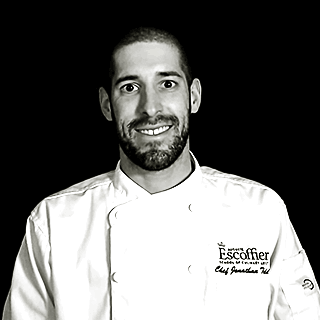 “There are a lot of culinary schools that don’t even mention farm-to-table or sustainability practices. They don’t get into the farming. And so I think the fact that we have [the Farm to Table® Experience], and we have so many instructors who actually care about it is really important to the students.”*
“There are a lot of culinary schools that don’t even mention farm-to-table or sustainability practices. They don’t get into the farming. And so I think the fact that we have [the Farm to Table® Experience], and we have so many instructors who actually care about it is really important to the students.”* “Just filling out the application and the FAFSA were the most difficult things I had to do to get the process rolling. The Financial Aid Department was great at communicating with me. Jordan and the team at Escoffier were always emailing me back and letting me know where I was and how things were going.”*
“Just filling out the application and the FAFSA were the most difficult things I had to do to get the process rolling. The Financial Aid Department was great at communicating with me. Jordan and the team at Escoffier were always emailing me back and letting me know where I was and how things were going.”*

